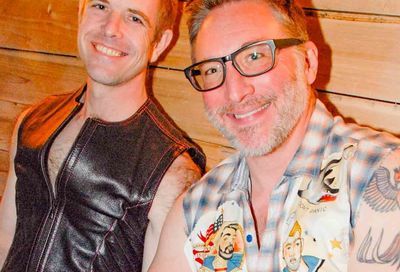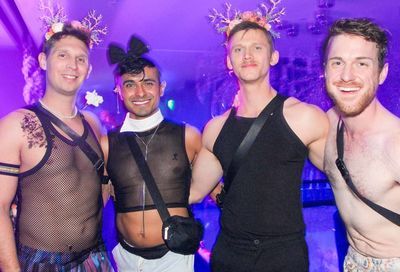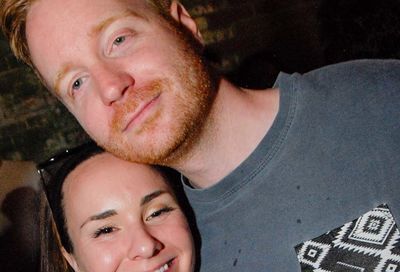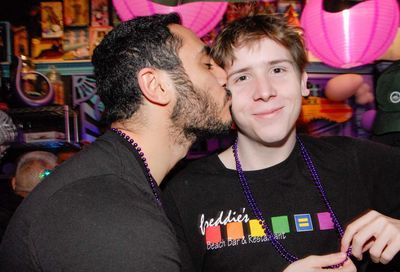15 Black LGBTQ Films Everyone Should See
From "Bessie" to "Young Soul Rebels" these movies showcase the best of black gay cinema

Every culture is comprised of subcultures. They are essential veins to a greater artery. And there is, arguably, no more profoundly resonant subculture within the LGBTQ movement than the African-American community. It’s been such a fertile territory for filmmakers that when deciding on a sixth installment for our “LGBTQ Films Everyone Should See” series, it stood out as a no brainer.
Of course, it helps that the low-budget Moonlight has become a launching pad of sorts, renewing a rapture for honest black cinema in a way that alluded such recent high profile entries like Nate Parker’s Birth of a Nation. Moonlight came in, stealth-like, and stole every bit of the thunder. Deservedly so.
The Oscar-nominated, Golden Globe-winning masterpiece sets a new bar for black gay cinema, if not all independent film. Poetic and resonant, it deploys a magnificently complex, ethereal narrative structure, offering the world a moviegoing experience that eschews Hollywood’s typical cookie cutter aesthetic for one daring, brave, and emotionally, intellectually powerful. It’s the standard from which all LGBTQ cinema will be compared moving forward. And like the the finest LGBTQ films — Beautiful Thing, Boys Don’t Cry, Brokeback Mountain — it remains true to itself, true to its heart. And that truth is what sticks with you long after the movie has ended.
Each of the 15 films selected for our list are just as true, making every single one of them — no matter who you are, no matter what your cultural assignation, no matter your sexual orientation — essential viewing. They inform, they entertain, they enlighten, they stir our collective souls. Most importantly, they leave us with a far better understanding of our LGBTQ culture, as well as the subcultures within, subcultures that provide real muscle to our mass.
In alphabetical order:

Bessie (2015)
Queen Latifah plays bisexual blues legend Bessie Smith in a film that took more than two decades to come to fruition. Directed and co-written by Dee Rees (Pariah), the Emmy-winning Bessie is buoyed by vivid performances, including Mo’Nique as Smith’s bisexual blues progenitor Ma Rainey, and zesty, stylish approaches to cinematography, music and sound. The movie never flinches from showing Smith and Rainey flirting and canoodling with other women, and is frank in depicting the long-term relationship Smith had with her female lover on the side at the same time she was married to her male manager. –Doug Rule
Available for streaming on Amazon Video and HBO Go, for rent on Vudu, and for purchase on Google Play, iTunes, and YouTube.

Brother Outsider: The Life of Bayard Rustin (2003)
Among the many unheralded LGBTQ heroes of the Civil Rights Movement of the ’50s and ’60s, out gay Bayard Rustin distinguished himself as a singularly visionary activist, organizer and leader. A chief lieutenant and counsel to Dr. Martin Luther King, Jr., Rustin helped steer King’s movement towards nonviolent resistance, while working to organize the crucially important Southern Christian Leadership Conference, and later, the 1963 March on Washington. As depicted in the electrifying biographical documentary, Brother Outsider: The Life of Bayard Rustin, the activist’s many accomplishments and sacrifices made during his lifetime often were overshadowed by his peers’ and his detractors’ discomfort with his sexuality, which Rustin refused to hide. Brilliantly employing archival footage of Rustin, King and their contemporaries, along with freshly filmed interviews, directors Nancy Kates and Bennett Singer offer abundant evidence of Rustin’s invaluable influence on the struggle for equal rights in this country regardless of one’s race, color, creed or sexual orientation. In the words of one of the many notables interviewed (including D.C. Congresswoman Eleanor Holmes Norton), the film addresses the complicated mystery shrouding Rustin’s legacy: “Why did he remain in the background; why was he an advisor to this, that or the other great person, but never himself coming forward in the full measure of his great talent?” While examining the causes and the cost of virtually erasing from the history books one gay activist’s contributions to progress, the film serves up a finely drawn portrait of a multi-faceted man of the people whose politics evolved with the times, and who should be more well-known. To that end, the soundtrack includes several songs Rustin recorded in his pre-activist life as a Harlem jazz singer. Reedy but impassioned, his voice will not be denied. —André Hereford
Available for DVD purchase and streaming at PBS.org, Newsreel.org, and SundanceNow.com, and for DVD rental from Netflix.

Brother to Brother (2004)
For all the turmoil and strife of city life, the so-called ghetto, or inner city, still can produce great movements of art, literature, poetry and music characterized by stunning beauty and transcendent passion. In his debut feature, writer-director Rodney Evans captures just such a charged moment in a romantic, gay-themed take on the 1920s Harlem Renaissance, a period of art, literature and culture as vibrant and influential as any in American history — if far less depicted on screen than, say, the Beat Generation. Boasting a sharp script and strong performances, the film depicts in handsomely-shot black-and-white those daring, talented African-American artists like author Zora Neale Hurston (Aunjanue Ellie), painter Richard Bruce Nugent (Duane Boutte), and poet Langston Hughes (Daniel Sunjata) who befriended each other, supported each other and helped galvanize what would become a revolution in America, the New Negro Movement, all while producing classic works that inspired generations of artists that followed. That legacy is explored via a contemporary parallel story, filmed in color, that features current onscreen Avenger Anthony Mackie in his first starring role. A fresh-faced Mackie plays Perry, a gay art student, who, while volunteering at a homeless shelter, meets an elderly Bruce Nugent, in whom he recognizes a version of his struggle to make art and accept his budding attraction to a white classmate. The film offers as witty and sprightly a look at the Harlem Renaissance as those buzzing figures of artistic and cultural sophistication might have concocted themselves. —AH
Available to rent on DVD from Netflix, and streaming on Amazon, iTunes and Youtube.
Read more:
25 Gay Films Everyone Should See: The Original
25 Gay Films Everyone Should See: The Sequel
Part 3D: 25 Gay Films Everyone Should See
13 Camp Films Everyone Should See
20 Gay Shorts Everyone Should See

Holiday Heart (2000)
On the heels of the global box office success of the Oscar-winning 1994 Australian hit comedy The Adventures of Priscilla, Queen of the Desert, Hollywood film and TV studios, for a brief, if not always shining moment, greenlit a cornucopia of films starring bankable male leads and action stars in the roles of drag queens. From Wesley Snipes, Patrick Swayze and John Leguizamo in the other three-queens-on-the-road comedy To Wong Foo…, to Philip Seymour Hoffman’s raw dramatic turn as struggling performer Rusty opposite Robert DeNiro’s straight-not-curious cop in Flawless, movie stars and filmmakers dipped their toes in the drag pond with varying degrees of financial and artistic success. In the case of Golden Globe-nominated TV drama Holiday Heart, directed by Robert Townsend (Hollywood Shuffle), the film’s success derives from its effective, matter-of-fact approach to some difficult subject matter, like substance abuse and religious persecution, and to a winning cast portraying complex, relatable characters. Starring Ving Rhames as gay Christian drag performer Holiday Heart, who takes in a drug-addicted single mom (Alfre Woodard), and helps raise her young daughter, the movie is as sentimental, though not as saccharine, as the Hallmark-style title implies. Through the struggles and tears, it delivers plenty of laughs and two outstanding lead performances in service to a moving story that could warm the hearts of grandmothers and drag mothers alike. —AH
Available for purchase on DVD from Amazon, and streaming on iTunes.

Leave It On the Floor (2013)
In the 25-plus years since the stars of Jennie Livingston’s landmark documentary Paris Is Burning taught the world the A-B-C-s of drag, voguing and house culture, LGBTQ influence on mainstream music, dance, fashion and language has progressed monumentally. Still, somehow the mostly black and Latino house ball scene — in which individuals and teams of every gender compete fiercely for prizes, status and family honor in a variety of arcane-to-obvious pageant categories — has remained steadfastly underground, with or without the world’s (and Madonna’s) attention. Shining a fabulous light on the camaraderie and creativity percolating underground, the voguing musical Leave It On the Floor follows handsome, gay black 22-year old Brad (Ephraim Sykes), shunned by his unaccepting mother but embraced by the House of Eminence, a makeshift family of fellow queer youth who also were bullied or excluded at school, and/or thrown out of the house by homophobic parents. An entertaining modern musical set in La-La Land, this high-spirited extravaganza dances not across L.A.’s towering freeways but through the real city these kids call home, with lively musical numbers, choreographed by frequent Beyoncé collaborator Frank Gatson, staged everywhere from a ballroom runway to a bowling alley. Written by Glenn Gaylord, directed by Sheldon Larry, and produced on a slim budget, especially for a musical, Leave It on the Floor is not the only feature film set within the ball scene. However, it is undeniably one of the most well-crafted and designed, with some breathtaking dancing and memorable, hip-shaking songs by lyricist Gaylord and composer Kimberly Burse. —AH
Available for streaming on Amazon, Vudu, Google Play and Youtube.

Moonlight (2016)
One of those rare and extraordinary cinematic experiences that pulls you deeply into its narrative, Moonlight wraps you in a time, place, and mood, artfully guiding you into an emotional payoff without ever feeling manipulative or artificial. It’s an extraordinary achievement in a cut-and-paste era of cinema, a time when movies fail to ignite so much as a spark of genuine, earned emotion. Moonlight exists in a class all its own. It’s not epic or big, but it is profound and profoundly moving. It’s one of those movies that you can feel changing you, boring into your heart, infiltrating your soul. The ’80s-set story of a young boy who comes to terms with his identity and sexuality in a harsh South Florida neighborhood refuses to lazily cleave to its genre. There are points in Moonlight where you expect certain things to happen, but the story constantly veers slightly off track, taking you on an unexpected journey elsewhere. Credit first the source material — Tarell Alvin McCraney’s lyrical play, In Moonlight Black Boys Look Blue. McCraney has found the perfect partner in Barry Jenkins, a director of extraordinary depth, insight and talent, who opens up McCraney’s work, elevating it to a new level. The lead character of Chiron is depicted with effortless, poetic perfection by three magnificent actors: Alex R. Hibbert, Ashton Sanders and Trevante Rhodes. The trio is supported by an astonishing ensemble, including Andre Holland, Oscar-nominated Naomie Harris, ebullient Janelle Monáe, and the Oscar-nominated Mahershala Ali, who gives the finest performance of a career comprised of nothing but finest performances. Moonlight is the best gay film since 1996’s Beautiful Thing, and the best African-American film since 1991’s Boyz in the Hood. —Randy Shulman
Releasing on Blu-Ray and DVD on Feb. 28. Now streaming on Amazon Video, Google Play, and iTunes.

Naz & Maalik (2015)
Jay Dockendorf’s comedy-drama offers an unusual spin on the classic coming out tale. Naz (Kerwin Johnson Jr.) and Maalik (Curtiss Cook Jr.) are two first-generation Muslim teens struggling with their sexuality who come to be spied upon by the FBI’s Brooklyn chapter. Their secrecy — stemming from a desire to keep their relationship hidden from their families — leads the Bureau to suspect them as active participants in the War on Terror. It’s an interesting take on life in post-9/11 New York, inspired by Dockendorf’s interviews with real Muslims who experienced the same treatment from the FBI. —Rhuaridh Marr
Available on DVD at Amazon and streaming on Amazon Video and Netflix.

Pariah
In the wrong hands, Pariah could have easily settled as the sum of its parts — a poignant look at a black teenager’s life as a lesbian in New York City. But under the careful eye of writer and director Dee Rees, whose own life inspired the movie, it’s a character-driven drama that beautifully explores social standards and barriers within black culture. Alike (Adepero Oduye), a 17-year-old high-school student, is stuck in a sexually difficult place. She’s not comfortable as a traditional butch or femme, frets about losing her virginity, and can’t see fitting in with straight crowds. At home, she hides her sexuality from her homophobic mother (Kim Wayans) and stern father (Charles Parnell), though they harbor suspicions. She’s only comfortable with her best friend, Laura (Pernell Walker), whose feelings for her may be more than platonic. And when she finally finds a relationship with a like-minded girl, it’s nowhere near what she expected. Rees balances Alike’s life with gorgeous camerawork, shooting behind corners and framing characters between everyday props to ground each scene in an urban reality. In a sly cinematic move, shots open wider and brighter as Alike grows into her sexuality and identity. It’s a difficult transition — and relationships are destroyed along the way — but it’s necessary to the message of the movie. And coupled with a stellar bit of acting from the entire cast, Pariah delivers that message with such unrelenting clarity that it’s hard not to be impressed. —Chris Heller
Available on DVD, Blu-Ray at Amazon and streaming at Amazon Video.
Read more:
25 Gay Films Everyone Should See: The Original
25 Gay Films Everyone Should See: The Sequel
Part 3D: 25 Gay Films Everyone Should See
13 Camp Films Everyone Should See
20 Gay Shorts Everyone Should See
Paris Is Burning (1990)
“You can be and do anything,” says one of the competitors when asked about the lure of the “drag balls.” With Paris Is Burning, director Jennie Livingston captures that sense of liberation, scratched from lives lived on the street in many cases. With the creativity that marks gay culture, the stars of this film are those at-risk youths — and some older veterans — who annexed a corner of harsh reality and collectively transformed it into something so fabulous that even Madonna had to copy it. Paris Is Burning is a documentary mélange of Rent meets Les Misérables meets Dynasty. And it’s beautiful. —Will O’Bryan
Available on DVD at Amazon and streaming at Netflix and on Amazon Video.

Punks (2000)
A courageous blend of heart, humor and attitude, Patrik-Ian Polk’s fabulous romantic comedy not only put a certain brand of buppie gay indie cinema on the map, it effectively introduced the fine (and foine) actor Rockmund Dunbar to legions of instant fans. Premiering at the 2000 Sundance Film Festival, the film also provided an early starring role for The Walking Dead‘s future “Father Gabriel,” Seth Gilliam, as Marcus, a hopeless romantic gay photographer living and loving in Los Angeles. Actually, the unhappily single Marcus isn’t getting nearly enough love. But luckily, just as Sex and the City‘s Carrie Bradshaw and her girls leaned on each other through misadventures with arrogant hunks, Marcus has his crew of ride-or-die road-dogs (the delightful Dwight Ewell, Renoly Sanitago, and L.A. drag performer Jazzmun) to see him through his confounding flirtation with the straight music producer next door (Dunbar). Four years before his hit comedy series Noah’s Arc launched on LOGO TV, Polk and crew conjured in this film all the glam and guy-candy (with slightly less polish) that distinguished that TV show as such a lushly visual treat. More importantly, Punks pioneered a portrayal of black, gay professionals outside New York City living out and proud lives profoundly enriched by friendship. —AH
Available for purchase on DVD at Amazon.

Starrbooty (2007)
A few years before the supreme Supermodel of the World, RuPaul, brought her wit and wisdom to the massively popular reality TV competition that’s rewriting drag herstory, she donned decidedly less glam duds to play secret agent Starrbooty in this entertainingly cheesy campfest. As any fan of RuPaul’s Drag Race knows, Mama Ru loves her pop culture references, and Starrbooty comes chock-full of knowing takes on everything from the garbage-movie aesthetic (and scatological humor) of John Waters, to the sexed-up, guns-and-boobs-baring action of ’70s blaxploitation cinema. Drag fans can get their gay education watching Ru go undercover as a streetwalker to rescue her niece from the world’s shadiest trafficking ring. Featuring an all-star cast of famous queens and porn stars (Lady Bunny, Michael Lucas, Candis Cayne), the raunchy comedy — produced by Ru, naturally — offers viewers a chance to see the usually upstanding glamazon get down and dirty in a parody of gritty L.A. detective stories that’s both too funny and totally wrong. Director Mike Ruiz, a frequent guest judge on Drag Race, keeps the action bubbling along with plenty of naked male eye candy and a bouncy soundtrack that’ll have viewers happily singing along to “S-T-A-Double R-Boo-tay.” –AH
Available for purchase on DVD from Amazon, and DVD rental from Netflix.

Tangerine (2015)
Tangerine is an important film for several reasons, but only one of them is perhaps its most oft-discussed feature: the 90-minute movie was shot almost entirely on an iPhone. The intimacy, the immediacy, the mobility of using a smartphone lends the film a near-documentary quality. Rather than keep viewer at arm’s length, Tangerine puts everything — limitations included — on-screen for audiences to absorb. Tangerine is also important for its casting: two African-American, transgender sex workers as protagonists. Sin-Dee (Kitana Kiki Rodriguez) is fresh from a month-long stay in prison. After convening with her best friend Alexandra (Mya Taylor), she learns that Chester (James Ransone), her boyfriend-cum-pimp-cum-dealer, has cheated on her with a “white fish.” Sin-Dee proceeds to stomp her way through West Hollywood intent on finding Chester. It’s utterly engrossing, aided immeasurably by the film’s strong, saturated colors and the slightly surreal nature of the iPhone’s digital video. The script was developed with the cast, lending dialogue a natural feel. The acting is only occasionally overdramatic, and there’s moments of quiet pathos mixed with genuine laugh-out-loud exchanges. Everything bursts with life and depth, and it’s a world that feels simultaneously repulsive and inviting. What’s more, it’s filled with stories and moments we rarely see on-screen. —RM
Available for purchase on DVD, Blu-Ray and download at Amazon and streaming on Netflix.

Tongues Untied (1989)
Directed by Marlon Riggs, Tongues Untied moves as an epic poem, with help from poet Essex Hemphill. With both men having died of AIDS-related complications in the 1990s, this beautiful, unconventional film would be considered a time capsule, were it not so timeless. Not plot-driven, not a documentary, Tongues Untied conveys feelings and images of black and gay experience. As the movie itself defies easy categorization, so too does it strive to show how compartmentalizing identity — black or gay or any other — is futile, that we are organic combinations of identities that grow and change and won’t be ignored. And it makes the point with a signature snap, thanks to the film’s guide to “snapthology.” —WOB
Available for DVD rental at Netflix.

The Watermelon Woman (1996)
Cheryl Dunye’s groundbreaking 1996 mockumentary-cum-interracial lesbian romance is a disarmingly clever and funny take on Hollywood’s seriously checkered past of black female misrepresentation both on and off screen. A sensation on the international festival circuit (it won major awards at the Sundance and Berlin Film Festivals), and a word-of-mouth indie hit in its initial run at the box office, the comedy stars writer-director Dunye as a confident butch video store clerk, named Cheryl, who becomes fascinated by the life and career of (fictional) Hollywood film actress Fae “The Watermelon Woman” Richards. Inspired to make a documentary about this forgotten figure from the ’30s and ’40s, Cheryl hunts down the truth about Richards and her same-sex romances, pursuing a mystery that leads back to Cheryl’s hometown of Philly. The movie thoughtfully examines film history, and genuinely celebrates those black actresses — from Gone with the Wind Oscar-winner Hattie McDaniel, to the unsung, often uncredited women like “Richards” — who eked out some career on the Golden Age silver screen playing mammies, maids, slaves and tribeswomen. It’s a triumph of daring themes and subject matter handled with a light touch. For added excitement, there’s the slightly meta parallel story of a modern-day romance between helpful clerk Cheryl and a white customer who frequents the store (Guinevere Turner, a triple-threat LGBTQ cinema icon in her own right). The onscreen girl-on-girl action between Dunye and Turner was deemed so risqué at the time that one elected official, incensed that public NEA funding had contributed to the film’s budget, sought to have that token monetary amount returned to the people. Twenty years later, the film, newly restored for a 20th anniversary special DVD re-release, stands as a remarkable tribute to black female talent within the film industry. —AH
Available for purchase on DVD/Blu-ray from First Run, and streaming on Vudu, Youtube and Google Play. On March 24, D.C.’s Reel Affirmations LGBT Film Festival will present it on the big screen at the Equality Center at H.R.C.

Young Soul Rebels (1991)
Released during a veritable renaissance for indie gay cinema — and considered an example of the so-called New Queer Cinema movement that also produced Poison, Swoon and The Living End — Isaac Julien’s music-driven drama captures a tense moment in London’s past while looking ahead to a more open and accepting future. Set in 1977, as punk rock and disco battled it out figuratively on the airwaves, while their respective scenesters came to actual blows in the streets, the film follows the adventures of two young black friends, gay Caz and straight Chris, who host a soul music spotlight on a pirate radio station. Sparked by the mystery surrounding the murder of one of the pair’s friends in a gay cruising area, Julien’s film pulses with energy as it confronts racism, homophobia, and that time-honored conflict of rock vs. disco. While the two inexperienced leads acquit themselves well, future film and TV stars Sophie Okonedo (Hotel Rwanda) and Eamonn Walker (Oz, Chicago Fire) make truly noteworthy debuts among a strong ensemble of young British talent. Appropriately, for a film set at the height of the Me Decade, Young Soul Rebels features a stellar soundtrack of classic ’70s funk and soul grooves by, among others, Parliament, Sylvester, Roy Ayers, and the Blackbyrds, whose proto-disco jam “Rock Creek Park” perfectly underscores the film’s dark-lit, dangerous, cruise-y atmosphere. —AH
Available for purchase on DVD from Amazon, and streaming at BFI Player.
Read more:
25 Gay Films Everyone Should See: The Original
25 Gay Films Everyone Should See: The Sequel
Part 3D: 25 Gay Films Everyone Should See
Support Metro Weekly’s Journalism
These are challenging times for news organizations. And yet it’s crucial we stay active and provide vital resources and information to both our local readers and the world. So won’t you please take a moment and consider supporting Metro Weekly with a membership? For as little as $5 a month, you can help ensure Metro Weekly magazine and MetroWeekly.com remain free, viable resources as we provide the best, most diverse, culturally-resonant LGBTQ coverage in both the D.C. region and around the world. Memberships come with exclusive perks and discounts, your own personal digital delivery of each week’s magazine (and an archive), access to our Member's Lounge when it launches this fall, and exclusive members-only items like Metro Weekly Membership Mugs and Tote Bags! Check out all our membership levels here and please join us today!
























